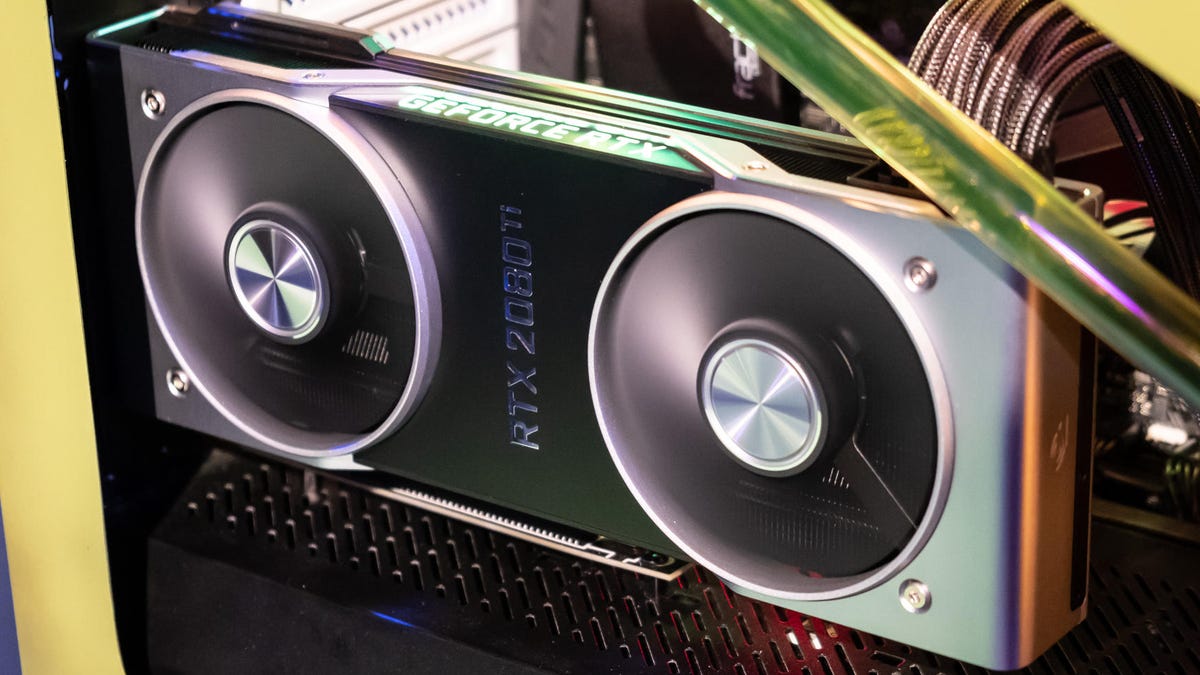Nvidia GeForce RTX 2080 meta-review: One $1,200 beast, one case of deja vu
Analysis: Nvidia's long-awaited GPUs are here -- but they're maybe not the upgrades you imagined?

The verdict is in, and frankly, it's not what we expected: Nvidia's GeForce RTX 2080 and 2080 Ti graphics cards may be powerful, but they may also be a tough sell for discerning PC gamers.
We read through pages and pages of reviews so you don't have to, and here are the major takeaways so far:
GeForce RTX 2080 Ti
- The $1,200 GeForce RTX 2080 Ti Founder's Edition is pretty clearly the fastest video card in the world -- it's even faster than the $3,000 Titan V in most games, according to Tom's Hardware.
- Aside from ridiculous juggernauts like the Titan V, it's the first card where reviewers were consistently able to play the most demanding games at a smooth 60 frames per second on a 4K monitor with maxed out graphics settings -- no tweaking necessary.
- But at $1,200 -- or $1,000 when Nvidia's partners sell their own versions -- who's to say it's not a ridiculous juggernaut too? Nvidia's last flagship GeForce card started at $700. You're paying Titan money for Titan-grade performance here. And you could build an entire gaming PC for that money.
- It consumes more power than previous-gen video cards -- AnandTech measured 50 watts more under load, and Ars Technica had to upgrade its computer's power supply in order to plug in a VR headset too.
GeForce RTX 2080
- Get this: The $800 GeForce RTX 2080 Founder's Edition isn't faster in most games than the $700 GTX 1080 Ti from March 2017. In game after game, reviewers found the new card neck and neck with a 1-and-a-half-year-old GPU. And sometimes, the older GPU won. Ars Technica called the eerily similar results "a serious case of déjà vu."
- The RTX 2080 is roughly 35 percent faster than the GTX 1080, depending on which reviewer you ask -- but entry-level GTX 1080 cards can now easily be found south of $500. It's just not a fair comparison, even once $700 OEM versions of the RTX 2080 begin to ship.
- It's not fast enough to play all of today's games at 4K and 60fps with maxed settings. If you don't want to mess with settings, it's probably a little more suited to a 2,560x1,440 (aka 1440p) monitor.
Both cards
- Nvidia didn't provide reviewers with a single game that had enabled RTX-exclusive features like raytracing and AI rendering, so the benefits of those are totally theoretical right now.
- Ditto the included VirtualLink port for single-cable VR headsets. No headsets support it yet.
- If you're running a 1080p monitor, both of these GPUs may be overkill -- many of these games are still CPU limited, meaning that even with the fastest desktop processors, your games can't run any faster than a certain frame rate.
- The new Founder's Edition dual-fan cooler appears to make these cards run slightly but notably quieter than previous generations. However, that may only apply to the Founder's Edition cards with their $100 to $200 premium.
A lot of PC hardware reviewers came to a lot of conclusions about Nvidia's new graphics cards, but these quotes rang particularly true:
Tom's Hardware: "If you aspire to game at 4K and don't want to choose between smooth frame rates and maxed-out graphics quality, GeForce RTX 2080 Ti is the card to own."
PC Perspective: "Until we see substantial software adoption of features like DLSS and real-time ray tracing in PC games , or the GTX 1080 Ti disappears from the retail channel, it would be impossible for me to recommend the RTX 2080 over the GTX 1080 Ti."
Ars Technica: "$1,200 is a lot of money to guarantee locked 4K/60fps performance at near-highest settings in your favorite PC games, while the wait and additional cost of the RTX 2080 feels like a lot to ask for when the above benchmarks tell us that the 1080 Ti still pretty much packs the same punch."
AnandTech: "[Gamers] will have to think long and hard about paying extra to buy graphics hardware that is priced extra with features that aren't yet applicable to real-world gaming, and yet only provides performance comparable to previous generation video cards."
It's going to be interesting to see if reviewers change their mind when games that support ray tracing arrive -- and when the less-expensive, $600/$500 GeForce RTX 2070 arrives next month.
You can find an even wider array of RTX 20-series reviews at Reddit.

